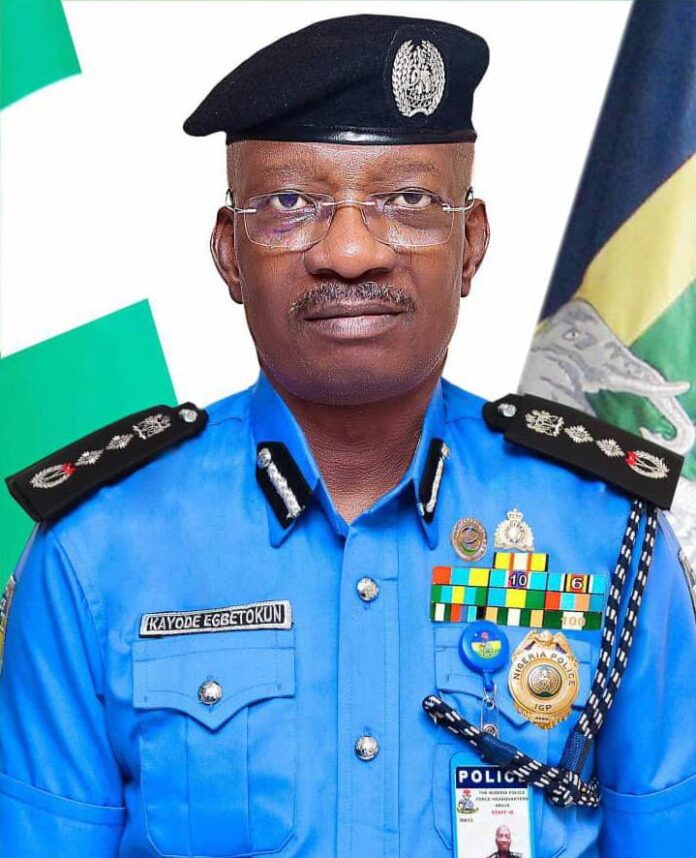Occupying the position of the Inspector General of Police (IGP) in Nigeria – a country of about 200 million people is by no means a pedestrian feat. To the un-discernible mind, the choice of who becomes the IGP may be taken for granted but the truth is that it comes through a rigorous process that takes into account, the pedigree of the personality in terms of educational background, physical fitness, operational acumen, administrative astuteness, reliability and above all, a patriotic disposition.
Since we operate in a democratic environment where plethora of interests across the various political divides dominate, it may not be possible to completely rule out some element of political consideration in the choice of who becomes the Inspector General of Police at any point in time, if only to appease some geo-political gods. However, such consideration cannot take precedence over and above the earlier mentioned qualities a potential IGP must possess.
It was therefore not surprising when Kayode Egbetokun was appointed by President Bola Ahmed Tinubu as the country’s 22nd Inspector General of Police in June, 2023. He assumed office on 19th June, 2023 after taking over from the former IGP Usman Alkali Baba. Until his appointment as the IGP, Egbetokun was Deputy Inspector-General of Police (DIG) in charge of Force Criminal Investigation Department, (FCID) Abuja.
Born on 4th September 1964 in Erinja in the Yewa South local government area of Ogun state, Egbetokkun graduated from the University of Lagos, Akoka, with a Bachelor’s degree in Mathematics in June 1987 and later he received a Master’s degree in Engineering Analysis in 1996. He briefly lectured Mathematics at the Yaba College of Technology, Lagos before he enlisted in the Nigeria Police Force as Cadet Assistant Superintendent of Police (ASP) on 3rd March, 1990.
Not too long in his career as a police officer, his sterling qualities began to manifest such that in 1999 as a Deputy Superintendent of Police (DSP), among many outstanding officers within the same rank range, Egbetokun was chosen as the Chief Security Officer to the then Governor of Lagos State, Bola Ahmed Tinubu who incidentally emerged the President of Nigeria in 2023. His choice by the President as Inspector General of Police could therefore not be a mere coincidence but a confirmation that he knows his onions as far as policing is concerned. It is obvious that his performance as the Chief Security Officer when Tinubu was the Lagos State Governor prepared the way for him, thus buttressing the fact that his appointment was not accidental as the President could have not opted for a misfit, if Egbekotun was one.
Over the years, convinced that knowledge is power, he went on to receive a postgraduate diploma in Petroleum Economics from Delta State University in 2000 and a Master of Business Administration (MBA) from Lagos State University in 2004. He also received a Doctor of Philosophy (PhD) degree in Peace and Security Studies from Al-Hikmah University in Ilorin, Kwara State. This acquisition of knowledge from various spheres has unarguably contributed largely in positioning him intellectually for the current job.
It is interesting also to note that over the years, Egbetokun has attended several professional courses both home and abroad including: Cadet Officers Course 16, 1990 at the Nigeria Police Academy, Wudil, Kano; Strategic Leadership and Effective Security/Safety Management Course at Citizenship and Leadership Training Centre, Shere Hills, Jos, Squadron Commander Course, PMF Training College, Gwoza, Borno State, Combat Operation Course, PMF Training College, Ila Orangun, Osun State, Advance Detective Course (ADC), Police Staff College, Jos, Intermediate Command Course (ICC), Police Staff College, Jos, Strategic Leadership & Command Course (SLCC), Squadron Commander/Combat Operations Course, PMF Training College (Desert Camp Gwoza, Forest Camp Ila), Global Conference on Chemical Security and Emerging Threats, Lyon France, among others.
Remarkably, prior to his emergence as the Inspector General of Police, Egbetokun’s career had taken him to various formations in the Police Force both at the state command level and at the Force Headquarters. Notably, he has served in such capacities as the Chief Security Officer to Lagos State Governor; Commander, Rapid Response Squad (RRS), Lagos State Police Command where he spearheaded groundbreaking initiatives aimed at curbing crime and fostering community engagement. Officer in Charge of Anti-Fraud Section, FCT Police Command, Abuja, Chief Superintendent of Police (Admin), Lagos State Police Command, Ikeja, Area Commander, Osogbo, Osun State Police Command, Area Commander, Gusau, Zamfara State Police Command, Commandant, Police Training School, Ikeja, Lagos, Deputy Commandant, Police College Ikeja, Lagos, Commissioner of Police, SERVICOM, Force Headquarters, Abuja, Commissioner of Police, Explosive Ordnance Disposal (EOD), Force Headquarters, Abuja, Commissioner of Police, Kwara State Police Command, Ilorin, Commissioner of Police, Medical Admin, Falomo, Lagos State, Assistant Inspector-General of Police, Zone 7 Headquarters, Abuja, FCT, and Deputy Inspector-General of Police, Force Criminal Investigation Department, Force Headquarters, Abuja.
Since his assumption of office as Inspector General of Police, he has not left anyone in doubt as to his determination to leave the Nigeria Police Force better than he met it. Towards achieving this, Egbetokun in the past one year and six months he has been on the saddle, taken some heart-warming steps that endear him to discerning members of the public. As a highly distinguished officer who understands the letters of the Universal Declaration of Human Rights, Africa Charter on Humans and the Nigerian Constitution with respect to the rights and dignity of persons, IGP Egbetokun has been operating within the limits of his statutory powers by not adopting anti-people tendencies in managing the Force.
Unarguably, there are certain bad elements within the Police Force just like we have in other security agencies and other sectors in society, yet it is remarkable to note that in recent national protests that would have stoked some violent reactions as we had in the past, the police under Egbetokun’s watch did their best to ensure that the rights of protesters were upheld particularly where the protests were peaceful. The 10-day nationwide protest that lasted between 1st to 10th August, 2024 was evidential in attesting to the fact that Egbetokun as the Inspector General of Police was out to promote peace and the rights of persons just as his announcement prior to the protest conveyed. Days leading to the protest, in his capacity as the chief law enforcement officer, Egbetokun had taken time to enlighten members of the public that the Nigeria Police Force was not opposed to any people-oriented protest insofar it was conducted in line with the extant rules governing mass protest. He assured protesters of police protection once they were ready to make it all peaceful affair.
With respect to the welfare of police, it is on record that within the first one year of Egbetokun as IGP there was a presentation of a total of N9.85billion to families of deceased officers under the Group Life Assurance. Similarly a total of 33,867 officers of different ranks were promoted based on merit, competence and available vacancies. Adding to these, was the declaration of April 7 as National Police Day by the President and Commander-in-Chief of the Armed Forces.
Under Egbetokun’s watch as the IGP, the police arrested no fewer than 35,496 suspects across the states for their involvement in various crimes. Out of this figure, a total of 29,052 suspects were prosecuted and police secured conviction on 16,200 of the cases. Within his first one year in office, a total of 1,907 kidnapped victims were rescued and 2,750 firearms recovered. Interestingly, more achievements have been made in recent times and one is not left in doubt that with more commitment of his officers and men, Kayode Egbetokun would robustly continue to wear the toga of “A Game Changer” he is poised to be with respect to policing in Nigeria



